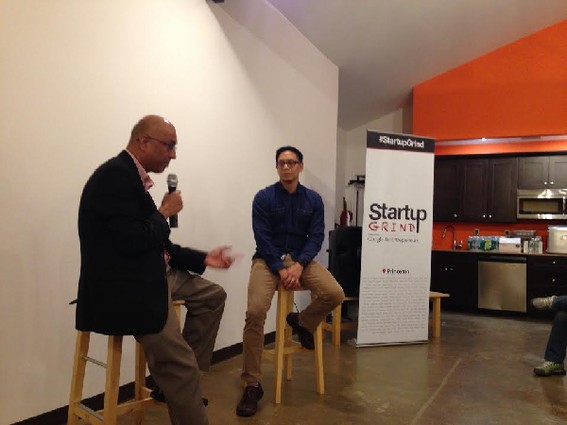Sanjay Macwan of NBC Universal Talks Future Tech at Startup Grind Princeton

Sanjay Macwan, of NBCUniversal, spoke about Media Labs (Englewood Cliffs), the corporation’s in-house technology incubator and accelerator, to a group of aspiring entrepreneurs at the Startup Grind Princeton meeting at Tigerlabs on October 15.
Media Labs partners with tech startups to drive innovation within the NBCUniversal network of businesses in the areas of film, television and theme parks.
According to Macwan, it is important for corporate professionals to get out there and talk with those in other industries who can challenge their conventional wisdom. Macwan views Media Labs as a “small startup within a large corporation” that goes through many of the same experiences that other tech startups face.
At Media Labs, the innovation process begins with the ideation phase, and then moves from discovery to proposal, proof of concept, a pilot program and, eventually, rollout.
Macwan said that Media Labs looks at ideas and concepts driven by one industry to see how they could potentially apply to other industries, a system that he admitted is both “fun and challenging.” The cornerstone of Media Labs’ work is partnering with technology startups and their founders.
A resident of Marlboro, New Jersey, Macwan is Media Labs’ CTO, and is tasked with focusing on emerging technology. According to Macwan, the key to Media Labs’ success is looking at the most important tech-driven themes, not only as they apply to NBCUniversal, but as they could apply to entire industries.
For example, in the early days of Media Labs, the organization was built around 29 “themes.” Last year, the company narrowed the number down to 12, and in 2015 settled on a top 10. Macwan said that this “template for looking at new themes” helps drive their work.
What are some of these themes? According to Macwan, ubiquitous internet access, the “ultra-connected consumer,” wearable technology, low-cost “smart” content production and the “content-finds-consumer” model are some of the big-picture trends to watch.
For Media Labs, succeeding on the cutting edge of media also requires vision and a willingness to ask the big questions.
Noting that driverless cars and virtual reality technology will be commonplace in five years, Macwan and his team must ask, “What will then be the role of a content company?”
Next-generation video formats and the growth of mobile-content viewing will also be main drivers of near-future media consumption, according to Macwan. He pointed out that the current content-consumer relationship is very one-way, and that there was an opportunity to flip it “180 degrees,” so that “content finds us” and the “platforms understand” the difference between our interests now versus our interest six months from now, based on what’s going on in our lives.
Macwan said that one of the main challenges in media today is distributing content cost-effectively. However, a challenge of the future will be finding a way to tell a story effectively using virtual reality.
An audience member asked Macwan how traditional networks like NBCUniversal plan to compete with new media outlets such as YouTube.
He responded that it will be important for them to find ways to work with and leverage new technologies and platforms.
Macwan added that Media Labs is using machine-learning technology and crowdsourcing to create a better language-translation experience for international television and film viewers. “We want to make sure that content is relatable among changing demographics.”
In partnership with a French startup called “Sculpteo,” NBCUniversal is also piloting a 3D printing program to enable greater customization of consumer products.
“We are testing this in France with Back To The Future, where you can customize your DeLorean with personal details,” he said to the pleased crowd. “The point is to get to customers in a unique and different way.”
Media Labs is also taking note of new media models in which relevant content organically bubbles up to the surface. In one of its new experiments, as browsers become more powerful, Media Labs is using that model with video content in a 3D environment.
“It will be like looking down into a pond, where relevant videos float up to the surface,” said Macwan.
Venture capitalist Bert Navarrete of Tigerlabs, who hosted the talk, asked Macwan what he thought was the coolest piece of emerging technology.
“Magic Leap. They’re onto something big,” he replied.
On the subject of New Jersey, Macwan said that his first job had been at Bell Labs, and that the Garden State admittedly “tugs at” his heart. He pointed out that profound innovations that society takes for granted had been created here, such as the transistor. But he added that New Jersey had lost traction over the last fifteen years or so because of the government, and that tech ecosystems have “moved on.”
He believes, however, that New Jersey has a very powerful combination of academics and finance, “just like Silicon Valley,” including Rutgers, The College of New Jersey, Princeton and Wall Street.
“I’ve seen tremendous energy over the past two or three years in New Jersey,” he concluded.

